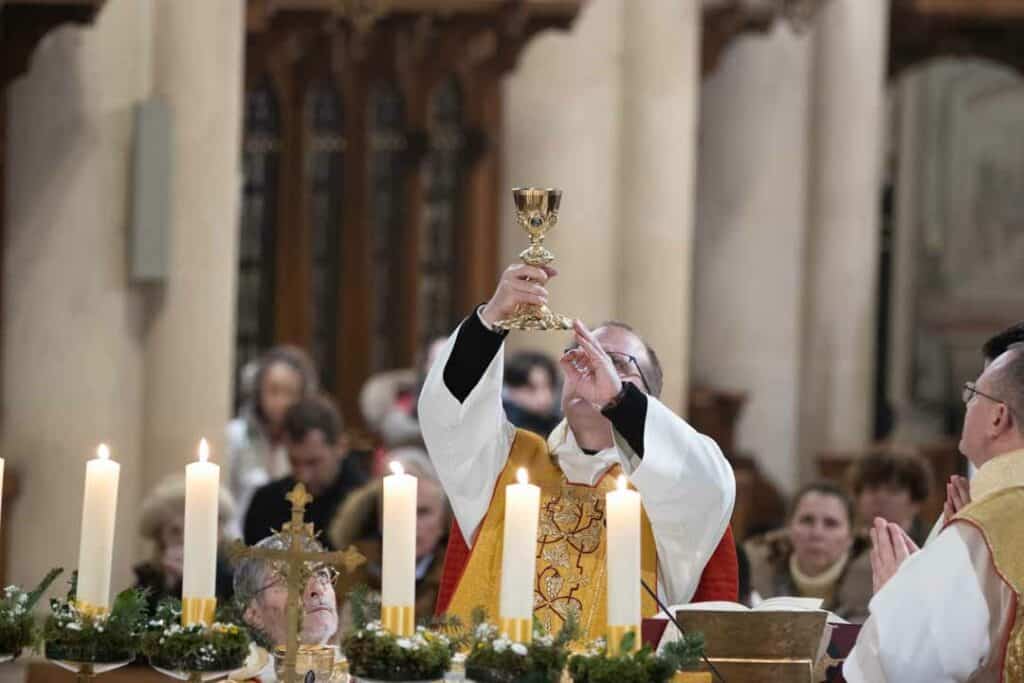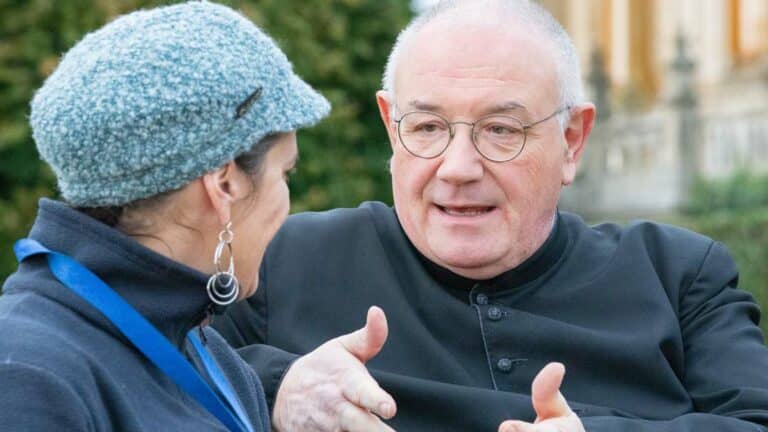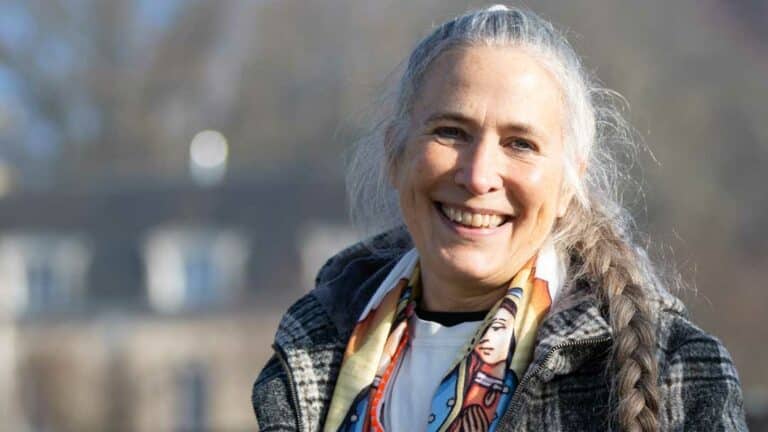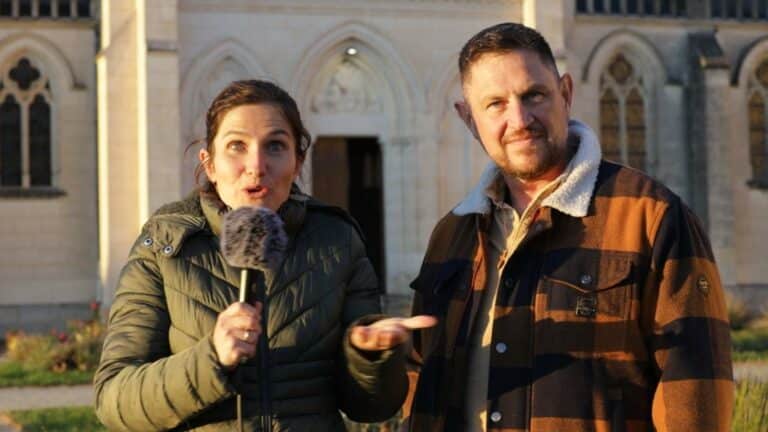Christmas – at least all the finicky details surrounding Christmas – often causes some tension. In my family, the tensions are related to the preparations: who will make the much desired Christmas log, even if there is not much time for it, or if the result might be hazardous? There are tensions surrounding the presents, which are hoped to delight the people they are aimed at and not to be resold the following day. The family gathering may also generate conflict: will the in-laws be hosting the meeting? Will there be criticism about the children’s education? Will the ever-successful sister in-law be there? Sometimes, we get tense because we are alone, or sad that Christmas will not be “like all others”. And last, there are tensions related to the preparation of the liturgy, or to make sure that everything will go smoothly.
In fact, Christmas is exactly the opposite of such tension. It is not about making anything tense but about receiving and allowing ourselves to be moved.
I would like to focus on three aspects of Christmas.
Today, once more, through the mystery of the Nativity, God lets Himself get closer to every man and woman. Not just to intellectuals in search of him but really to each one of us. What is made clear on Christmas Day is that God, the Universal, comes in close proximity to us, incredibly close in fact. So what we receive essentially is this mystery. In God’s plan, the child Jesus comes to get close to each shepherd. From all eternity each one of them has been desired, each one has been awaited by the son of God at the manger. This is what this Christmas night reflects.
The material Universal
Recently, a monk asked me to write a review on a book by Juval Harari, Homo Deus. Interestingly, the starting point is a lot of preconceptions about human experience and history. After identifying a number of revolutions in man, he starts from the Individual to try and reach the Universal. In fact, we all try to do this, because such is the nature of the human mind. Starting from our own individual experiences we want to encompass something more universal. This is the purpose of science – discovering the laws presently existing and that existed much earlier than us. We realize that there are universal laws, like gravity. Starting from experience, sociologists, political scientists, philosophers – in fact all of us as well – strive to reach to the universal dimension, sometimes with errors or emotional distortions which warp our judgment.
Now, the beauty of Christmas is that the Universal – the infinite, the uncreated, the eternal, what infinitely surpasses the visible and the invisible – steps into History. God, the Universal, God the Infinite, enters the very materiality of life. This plunge of God is crazy, the Son of God, who is infinite, eternal, perfect, almighty, transcendent, in other words, he is infinitely other and beyond the universe, well, God plunges into the very concreteness of human History.
The Lord meets us in the ordinary course of our lives
The second insight given by the Gospel according to St Luke is very ordinary: “Joseph also went up from the town of Nazareth in Galilee to Judea, to Bethlehem (…) He went there to register with Mary, who was pledged to be married to him and was expecting a child. While they were there, the time came for the baby to be born, and she gave birth to her firstborn, a son...” Is there anything more common and ordinary than this story about two anonymous people who leave Nazareth to get registered in Bethlehem, a pregnant woman, a husband, a child that is born? However, behind this apparent insignificance, God introduces something extraordinary: the angels appear to the shepherds, who transition from the ordinary course of their lives to an extraordinary reality. Indeed, we can access the extraordinary dimension of Christmas through its most commonplace, basic reality.
What about myself? How do I live my ordinary life? Let’s admit that we expect magic in our lives, however God is not magic, God is not extraordinary. But, through his son, God comes and meets us in all the ordinary things in our lives. In fact, love is ordinary ; it is extraordinary in the ordinariness. This is what we are reminded through the mystery of Christmas. We are encouraged to consent to this everydayness with our hardships, difficulties, sorrows, questioning or our desires. What about a little treatment of ordinary life during our Christmas break? It is hard and yet, it is where the Lords comes to meet us, in ordinary love. Are we able to gladly welcome the ordinariness of love, rather than spending our time to wait and, as a result, missing the most essential things in our life? The Lord comes and meets me in my ordinary life. And He loves this.
The Lord is peace
A final thought, in this proclamation from the prophet Isaiah: “Wonderful counselor, Prince of Peace, give us peace.” We often ask God to give us peace but we need to go further. He is of course the Prince of Peace, the One who gives peace. We have already heard this in a prophecy by Micah: He is peace. So when we welcome the Lord, when we welcome the baby Jesus from the manger, we welcome peace. If I seek peace, if I want peace, I am invited to welcome the Lord through it. By living close to Him, in the midst of difficulties, questions, or hardship, I get a taste of peace, because He is peace. How do I receive this Peace on Christmas Day?
A year dedicated to hope
Finally, as you know, just this evening we are entering a Holy Year, with Pope Francis opening the Jubilee in Rome two hours ago and launching a holy year dedicated to Hope. This holy year starts under the sign of hope, with the birth of a child. Like a new childbirth in a family, this event projects us into the future. This is not the ‘horizontal’ hope of continuing life, nor of the transmission of heritage. In fact, this child, Jesus, takes us into his future. By being born, the Son of God opens a crack in this world which seems to be living enclosed on itself as if under a bell. He comes to fetch us and take us towards his future, a future beyond history, time and the world.
He is our peace, He is our hope. To all, a merry and holy Christmas and Jubilee Year of Hope. AMEN




